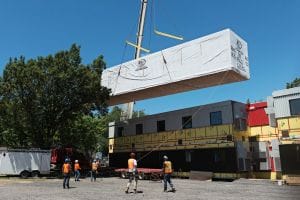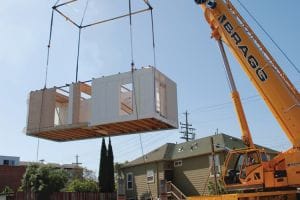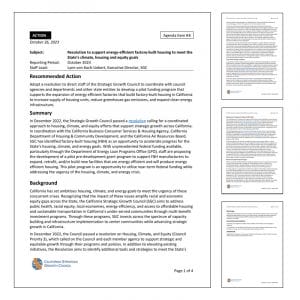MBI Members Provide Testimony to White House Regarding Concerns about Davis-Bacon Act Expansion
On a recent call with the White House’s Office of Information and Regulatory Affairs (OIRA), several MBI members provided testimony about the potential impact expanding the Davis-Bacon Act (DBA) would have on their companies and the industry.
Under the Department of Labor’s Wage and Hour Division, the Administration is proposing to expand the ninety-year old construction law to cover “secondary sites of work” which would include modular prefabrication plants for the first time ever.
In addition, the Department of Labor’s estimated cost of compliance with the proposed DBA expansion was stated as a paltry $78!
MBI members provided testimony in several key areas, including:
- Cost of compliance. Testimony was offered showing that it would actually require some manufacturers to hire an additional HR/payroll person to monitor and track all the various wages in the factory, ensure the accuracy, and submit the required certified payrolls at a cost closer to $75,000!
- Cost of projects. Two members (a developer and a GC) offered testimony that the cost of projects would increase by 25-30%, which is counter-productive to President Biden’s affordable housing initiatives.
- Voided contracts. Multiple members mentioned that their current GSA contracts would immediately need to be voided based on expected increases in cost, again adding to the compliance costs.
- Lost revenue. Several members stated that they would not be able to bid federal work if the proposed rule become final, costing their small businesses a significant portion of revenue.
- Inability to comply. Lastly, a key point made was that, despite the project and compliance cost, some modular companies simply cannot comply with the rule as written. MBI member testimony detailed how the worker risk, roles, and responsibilities are different in a factory versus on site.
The Opposition Continues
It is important to note that MBI is not opposing the Davis-Bacon Act itself, just the unprecedented expansion to offsite factories. Many MBI members are involved on Davis-Bacon projects and do pay federal prevailing wages on the site of work as defined by the DBA.
It was extremely important for the White House to hear directly from companies impacted by this proposed rule. OIRA’s review is the last step before the final rule gets published in the Federal Register. We are grateful for our members who took one more shot at getting the Biden Administration to reconsider this terribly misguided policy change. Once the final rule is published (expected in the next 30 days), MBI will review and assess our next steps including possible legal action against the Department of Labor.
MBI would like to thank the following members for their testimony on the call:
- Stephen Shang of Falcon Structures in Texas
- Mike Wilmot of Wilmot Modular in Maryland
- Brad Gudeman of Modular Genius in Maryland
- John Buongiorno of Axis Construction in New York
- Matt Slataper of Ramtech Building Systems in Texas
- Vaughan Buckley of VBC in California, Philadelphia, and Europe
- Jim Gabriel of Modlogiq in Pennsylvania
- Amin Irvin of Ginosko Development in Michigan
- Alan Rasmussen of Modern Building Systems in Oregon
How Can You Help?
Please consider making a one-time donation to MBI’s legal defense fund to ensure we have necessary funds to prevent this massive barrier to industry growth.
AND
Support Our Efforts to Help Grow the Industry - MBI's focus is to identify, reduce, and remove barriers while capitalizing on opportunities in key markets. To be successful, it is imperative that we continue to build our war chest, so funds are available when needed.
We are asking all MBI member manufacturers to purchase one $20 MBI Seal for each new module constructed.
Additional Government Affairs Articles
A Huge Win for the Modular Construction Industry in Massachusetts
In early February, 2024, the Massachusetts Board of Building Regulations and Standards (BBRS) released its proposed 10th Edition building codes. This draft included several amendments targeting modular construction that would have created an extremely difficult environment for the entire modular industry and could have eliminated the industry entirely in the state.
Read Complete ArticleFEMA Announces Hawaii Housing Plan Using Modular Construction
Utah becomes the second state in the country, following Virginia, to fully adopt ICC/MBI standards 1200 and 1205. MBI will continue to work with leadership in Utah to implement the new program.
Read Complete ArticleICC/MBI Standards 1200 & 1205 Provide Foundation for Utah’s First-Ever State Modular Program
Utah becomes the second state in the country, following Virginia, to fully adopt ICC/MBI standards 1200 and 1205. MBI will continue to work with leadership in Utah to implement the new program.
Read Complete ArticleBuilding at the Intersection of Housing Affordability & Energy Conversation
Tasked with looking at how the state of California can best house its growing population while meeting its aggressive energy, housing, transportation, land use, and equity goals, the California Strategic Growth Council (SGC) faces a slew of challenges. But, if the outlook of SGC Executive Director Lynn von Koch-Liebert is any indication, it’s only a matter of time before those challenges are successfully met.
Read Complete Article



